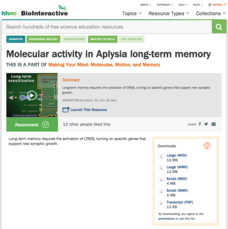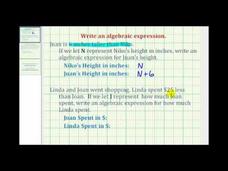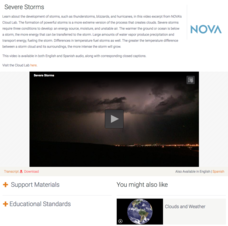Mathispower4u
Solve a Linear Equation With Decimals and Variables on Both Sides (Example)
Create better equation solvers! The video presentation tackles solving an equation with variables on both sides with decimal coefficients. The instructor explains how to multiply by a constant to eliminate the decimals before continuing...
Mathispower4u
Solving Multiple Step Equations
Not only can equations have many steps to solve, but those steps can look very different from equation to equation. The narrator of the video lesson explains the steps to solving six different multi-step equations. He provides...
Howard Hughes Medical Institute
Motor Cabal Toxins Block Motor Neuron Synapses
Cone snails release four different toxins, each capable of paralyzing a fish. An animation demonstrates that the toxins work independently, and then explains the impact of this redundant system on the nervous system.
Howard Hughes Medical Institute
Development of the Human Embryonic Brain
Viewers follow the development of a human embryo, the brain, and the number of neurons at each stage. They learn when the brain stops growing and the importance of neural connectivity.
Howard Hughes Medical Institute
Molecular Activity in Aplysia Long-Term Memory
How does information move into long-term memory? Scholars view the process at the molecular level with an animation. They learn about synaptic growth and how specific genes become active.
Mathispower4u
Writing Variable Expressions (Examples)
Variables are the name of the game. The video instructor explains the importance of defining a variable and then models how to write an expression. He reviews three different problem scenarios and then builds expressions to model each...
Mathispower4u
Write Algebraic Expressions (Example)
Expressing words as numbers and symbols ... that is the task at hand. Given a contextual situation, it is often necessary to rewrite the information as expressions. The video demonstration shows two examples of this concept and gives...
Howard Hughes Medical Institute
Signal Molecules Trigger Transcription Factors
How do transcription factors change the function of a cell? Learn how three similar cells find different functions based on their locations and the number of triggers available. Observe an animation of the process of assigning a trait...
Mathispower4u
Write Algebraic Expressions from Statements: Form ax+b and a(x+b)
Write an expression from an expression, verbal to algebraic. A quick video lesson gives pointers on how to write algebraic expressions from words. Stressing important vocabulary and order of the expression help to develop an...
Mathispower4u
Write Basic Expressions from Words Modeling Situations
Writing expressions is a basic skill of algebra—but it's a skill that causes scholars to struggle. A thorough video provides examples and explanations to help individuals understand the process. From defining the variable to representing...
Mathispower4u
Writing Basic Algebraic Expressions (Example 1)
Turning words into symbols, a powerful application of mathematics. A video lesson explains how to rewrite a problem-solving question with expressions. The instructor emphasizes the need to define variables.
Mathispower4u
Write Expressions and Determine the Measure of Complementary Angles (Example)
Investigate algebraic applications of complementary angles. Young scholars watch as the instructor describes and defines complementary angles. He then shows an example of finding an unknown value of x given expressions for a pair of...
Mathispower4u
Write Expressions for Complementary Angles and Supplementary Angles (Basic) (Example)
A straightforward lesson explains the meaning of complementary and supplementary angles. The instructor uses both an algebraic representation and a numeric example to describe each angle pair.
Mathispower4u
Writing Expressions to Solve a Linear Equation App: Stamps
Learners build skills for writing and solving equations with a video that describes the process for writing expressions and then an equation to solve a problem. The problem asks for the number of nickels and dimes needed given a set of...
Howard Hughes Medical Institute
Repellant Ephrin Signals Guide Limb Innervations
The foot bone connects to the leg bone, but how? Learn about how neurons grow in the proper direction thanks to signalling. Observe what happens when they encounter a repulsive ephrin signal and the correction process that takes place.
PBS
Clouds and Weather
The sun heats Earth's surface unevenly, causing crazy weather patterns around the globe. A NOVA video describes the resulting changes in air pressure, temperature, humidity and their impacts on weather. It connects the concepts to...
PBS
Severe Storms
Approximately 2,000 thunderstorms happen simultaneously across the planet at any given time—that's a lot! Beginning with how clouds form, NOVA describes the conditions needed for storms to develop, and highlights the three factors that...
Howard Hughes Medical Institute
Anole Lizards: An Example of Speciation
What happens to a species when members become separated by changes in their environment? Present young biologists with the ultimate example species—the anole lizard. A brief video describes the origins of the multitude of anole species...
Howard Hughes Medical Institute
Gorongosa's Water Cycle
Gorongosa National Park holds a fascinating and ever-changing landscape. What makes the water cycle in the park so special? Travel to Mozambique to learn more about the park using a short video. Content includes rainy season in the park,...
TED-Ed
Why Some Countries Are Poor and Others Rich
It's a question economists, anthropologists, and sociologists have asked themselves since the first regional lines were drawn in the sand. Are there common factors that destine one country to thrive and another to struggle? An...
PBS
The Climate Wild Card
If Earth didn't have clouds, the global temperature would be at least 22 degrees Fahrenheit warmer. Viewers examine the importance of clouds on temperature, climate, and global warming. The video describes the current impact of clouds...
PBS
Why So Many Cloud Types?
Scientists categorize clouds by both height and shape since both traits impact the weather independently. Viewers fly high to learn about the characteristics of each type of cloud. NOVA explains the composition of clouds, the atmospheric...
PBS
The Coriolis Effect Due to Earth's Rotation
Why do big storms spin as they travel? As Earth spins, the movement of air and water change. Viewers observe the Coriolis effect on paper airplanes, water, and even hurricanes—and find the effect is everywhere!
TED-Ed
How Does Hibernation Work?
Did you know animals hibernate all around the world, even in the deserts and tropical rain forests? How do these animals reach extreme body temperatures and undergo a decreased heart rate that would be deadly to non-hibernating animals?...























